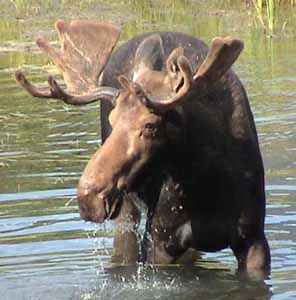Animals
Last Minute Shopping?
I was originally going to display three or four of the most unique items from Archie McPhee's web store to give you an example of the true weirdness you can find there (vengeful unicorns, remote controlled hopping yodelling lederhosen, bacon bath soap, inflatable toast). But once I started digging deeper to find just the right ones, I realized there was no way I could stick to just a few. My fellow WUvians needed to see all of the zany craziness that McPhee's has to offer. And how can you resist any company whose motto is "Slightly Less Disappointing Than Other Companies". So if you're in need of a last minute gift idea for the weirdo on your list, this is the place for you.
Posted By: Nethie - Tue Dec 15, 2009 -
Comments (6)
Category: Animals, Art, Bathrooms, Body, Humor, Shopping, Toys, Candy
Kickin’ It With The Kitties

Posted By: Nethie - Thu Dec 10, 2009 -
Comments (8)
Category: Animals, Inebriation and Intoxicants, Cats
Turkey Feather Wedding Dress
In 1947, a gal named Barbara Ehrhart chose to create her wedding dress out of turkey feathers.The guests tossed more feathers instead of rice.
More pix here, courtesy of LIFE.
Posted By: Paul - Thu Dec 03, 2009 -
Comments (5)
Category: Animals, Eccentrics, Fashion, Marriage, 1940s
An Apple a Day…

Posted By: mdb777 - Sun Nov 29, 2009 -
Comments (5)
Category: Animals, Death, Wives
Electric Chair for Lobsters

A Lawyer in Jolly old Britain has invented a new method of killing lobsters. The "Crusta-Stun" (presumably a shortening of crustacean and stun gun) will retail for about £2,000. That's around $3,300. Yikes.
This "humane" way to dispatch your lobster is supposedly even sanctioned by PETA. If we invented machines big enough for cows, does that mean beef's back on the menu too?
The image above originally comes from MAKE
Posted By: dherlich - Wed Nov 25, 2009 -
Comments (2)
Category: Animals, Food, Ethics and Morals
Giant Aussie Earthworms
Posted By: Paul - Fri Nov 20, 2009 -
Comments (1)
Category: Animals, Australia, Natural Wonders
Lions And Tigers And Bears, Oh My!

Meanwhile Mr Zhu, a 61 year-old retired teacher from China’s Jiangxi province, let his curiosity get the better of him during a vistit to the circus in Nankang, and put his hand though the bars of a tiger’s cage to feel its fur. The tiger promptly bit off four of his fingers. Zhu collapsed on the spot with shock, but survived to receive 3500 yuan (about $500) in compensation. The tiger was unharmed by the incident, but felt hungry again 15 minutes later (Times of India).
Less aggressive, but equally troubling, is the giant bear that has made its home near Lake Tahoe, Nevada, described by one resident as “super smart”. The residents of Incline Village are enduring almost nightly visits from a 700 lb black bear that has already caused $70000 of damage this year. The bear has evaded the traps set for it and the patrols looking for it, and has even survived a couple of rounds from a .44 magnum, one of which reportedly bounced off its skull (Las Vegas Sun).
In other (not actually) bear news, Australian marsupial pinup the Koala is looking at a bleak future according to recent reports. The loss of eucalyptus trees through deforestation, dog attacks and car accidents are stressing the animals to such an extent that they are succumbing to usually harmless viral infections. Frank Carrick of Queensland University’s Koala Study Program said the koalas were in “diabolical trouble” and that their numbers were “declining alarmingly”. (Washington Post). The Australian Koala Foundation estimates that there are fewer than 100000 koalas left in the wild, maybe as few as 43000, and the mainland population could go extinct in as little as 30 years (New Scientist).
Finally, a crocodile bit of more than it could chew this week when it strayed too close to a bloat of hippopotami and their young, who promptly formed a threatening defensive ring. Startled, the crocodile attempted to escape over the backs of the angry hippos, a fatal mistake. The croc’s scaly hide was no defence against the 3000-4000 lbs of bite pressure of an adult hippo, and it was soon crushed to death in their jaws (Telegraph).
It's a far cry from the cretaceous period where, according to new fossil finds, crocodiles were the extraordinarily successful inhabitants of a swampy region that was to become the Sahara Desert. Given nicknames like "boarcroc" and "ratcroc", the fossils show a plethora of different crocodile species living alongside each other, with each adapted to different ways of life. Some, like "dogcroc" and "duckcroc" have oddly shaped braincases that suggest they may have been considerably more intelligent than their modern descendants (Times).
Posted By: Dumbfounded - Thu Nov 19, 2009 -
Comments (2)
Category: Animals, Death, Stupidity
Aqua Frolics
'Why not have your Thanksgiving turkey dinner underwater this year?
Posted By: Paul - Wed Nov 11, 2009 -
Comments (2)
Category: Animals, Exercise and Fitness, Movies, Documentaries, Recreation, Sports, 1950s
Chinese Fruit Bats Engage in Some Kinky Behavior

A scientific paper published today on http://www.plosone.org details some interesting bat behavior. The article title really says it all Fellatio by Fruit Bats Prolongs Copulation Time. The paper's abstract goes on to state "A positive relationship exists between the length of time that the female licked the male's penis during copulation and the duration of copulation. Furthermore, mating pairs spent significantly more time in copulation if the female licked her mate's penis than if fellatio was absent."
The image above (and a more in-depth discussion of naughty bat behavior) comes from this article on Treehugger.com
Posted By: dherlich - Wed Oct 28, 2009 -
Comments (6)
Category: Animals, Science
Black Sheep
In line with the WU theme of "dangerous domestic animals...."
Anyone actually seen this?
Posted By: Paul - Sun Oct 25, 2009 -
Comments (6)
Category: Animals, Death, Movies, Parody, South Pacific

| Who We Are |
|---|
| Alex Boese Alex is the creator and curator of the Museum of Hoaxes. He's also the author of various weird, non-fiction, science-themed books such as Elephants on Acid and Psychedelic Apes. Paul Di Filippo Paul has been paid to put weird ideas into fictional form for over thirty years, in his career as a noted science fiction writer. He has recently begun blogging on many curious topics with three fellow writers at The Inferior 4+1. Contact Us |






